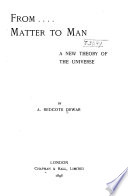 Law of gravitation: Every particle of matter in the universe attracts every other particle with a force varying directly as the product of their masses and inversely as the square of the distance between them. Law of gravitation: Every particle of matter in the universe attracts every other particle with a force varying directly as the product of their masses and inversely as the square of the distance between them.  Fourteen Weeks in Descriptive Astronomy - Page 34by Joel Dorman Steele - 1874 - 336 pagesFull view Fourteen Weeks in Descriptive Astronomy - Page 34by Joel Dorman Steele - 1874 - 336 pagesFull view - About this book
 | A. Redcote Dewar - Cosmology - 1898 - 318 pages
...discriminate attraction, as exemplified in the preceding primary laws of energy. (b) The Mathematical Law of Gravitation : " Every particle of matter in the universe attracts every other particle with a force whose direction is that of a line joining the two, and whose magnitude is directly as... | |
 | Harry Thurston Peck - Encyclopedias and dictionaries - 1898 - 988 pages
...generalization to be afterward» mentiened, Newton is understood to have at first rested his law of universal gravitation • "Every particle of matter in the universe attracts every other particle with a force directly proportioned to the mass of the attracting particle, and inversely to the square... | |
 | Karl Pearson - Causation - 1900 - 598 pages
...reader must note that this hypothesis of the particle is made use of by Newton in the statement of his law of gravitation : " Every particle of matter in the universe attracts every other particle" he tells us, in such and such a manner. Yet Newton is here dealing with conceptual notions, for he... | |
 | Edward Richard Shaw - 1901 - 342 pages
...of Conservation of Eneryy. SUMMARY. Gravitation is the attractive force which acts between masses. Law of Gravitation. — Every particle of matter in the universe attracts every other particle. This attraction is directly as the mass and inversely as the square of the distance through which it... | |
 | William Simon - 1901 - 668 pages
...hereafter, that the law of Avogadro is one of the greatest importance to the science of chemistry. Gravitation. Every particle of matter in the universe attracts every other particle ; consequently, all masses attract each other, and this attraction is known as gravitation. The action... | |
 | Carl Webber - Astrology - 1902 - 174 pages
...are not our necessities, desires and feelings the same in winter as in summer? Newton declared: — "Every particle of matter in the universe attracts every other particle of matter with a force or power directly proportionate to the quantity of matter in each, and decreasing as the squares of... | |
 | James Morgan Hart - English language - 1902 - 242 pages
...expounding a general law is illustrated by Tait's formulation—based upon Newton's Principia—of the law of gravitation : Every particle of matter in the universe attracts every other particle with a force whose direction is that of the line joining the two, and whose magnitude is directly as... | |
 | George Albert Wentworth - Algebra - 1906 - 440 pages
...(1)F=^-2; (2) F = ^^. NOTE. It takes g poundals to make a pound and g dynes to make a gram. 7. Universal Gravitation. Every particle of matter in the universe attracts every other particle with a force that varies as the product of their masses divided by the square of the distance between... | |
 | Astronomy - 1908 - 506 pages
...to the present attitude of astronomers toward the law of gravitation itself. This law declares that every particle of matter in the universe attracts every other particle of matter. The precise conditions under which such attraction is supposed to have effect I disregard for the moment... | |
| |